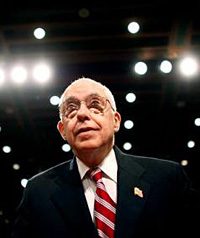
|  |  |  Editorials | Opinions | August 2008 Editorials | Opinions | August 2008  
New Rush to Spy
 The New York Times The New York Times
go to original


| | During his congressional confirmation hearings, Michael Mukasey testified that he would act independently of the White House. (AFP/Getty Images) | | |
There is apparently no limit to the Bush administration's desire to invade Americans' privacy in the name of national security. According to members of Congress, Attorney General Michael Mukasey is preparing to give the F.B.I. broad new authority to investigate Americans - without any clear basis for suspicion that they are committing a crime.

Opening the door to sweeping investigations of this kind would be an invitation to the government to spy on people based on their race, religion or political activities. Before Mr. Mukasey goes any further, Congress should insist that the guidelines be fully vetted, and it should make certain that they do not pose a further threat to Americans' civil liberties.

Mr. Mukasey has not revealed the new guidelines. But according to senators whose staff have been given limited briefings, the rules may also authorize the F.B.I. to use an array of problematic investigative techniques. Among these are pretext interviews, in which agents do not honestly represent themselves while questioning a subject's neighbors and work colleagues.

Four Democratic Senators - Russ Feingold of Wisconsin, Sheldon Whitehouse of Rhode Island, Richard Durbin of Illinois and Edward Kennedy of Massachusetts - have written to Mr. Mukasey and urged him not to sign the guidelines until they are publicly announced and national security and civil liberties experts have had a chance to analyze them.

We concur, and we would add that there should be full Congressional hearings so Americans can learn what new powers the government intends to take on.

The F.B.I. has a long history of abusing its authority to spy on domestic groups, including civil rights and anti-war activists, and there is a real danger that the new rules would revive those dark days.

Clearly, the Bush administration cannot be trusted to get the balance between law enforcement and civil liberties right. It has repeatedly engaged in improper and illegal domestic spying - notably in the National Security Agency's warrantless eavesdropping program.

The F.B.I. and the White House no doubt want to push the changes through before a new president is elected. There is no reason to rush to adopt rules that have such important civil liberties implications. |

 |
|  |



